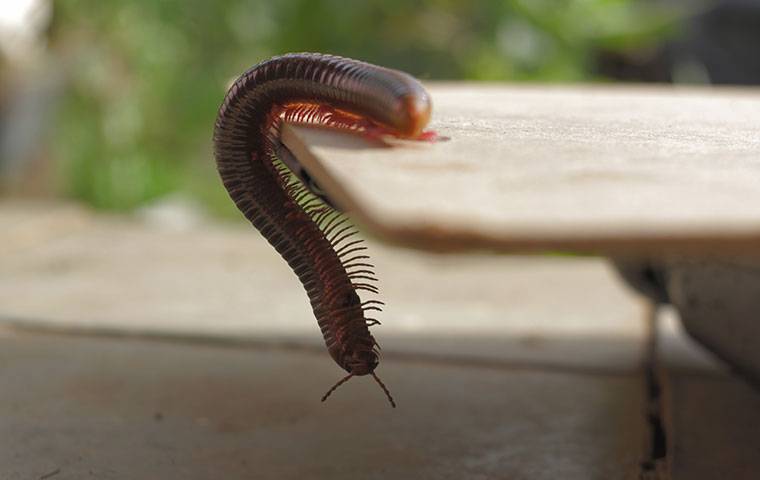Isn’t it disgusting to find millipedes crawling in your bathroom, backyard, basement, or even worse – your bedroom? These small, squirmy creatures are not dangerous to humans, but their presence in the house is not pleasant at all. Althoughmillipedes don’t bite or sting or transmit any disease, the only thing that can bother you is the foul-smelling fluid that they release.
People often get confused between centipedes and millipedes. While centipedes have up to 177 pairs of legs, millipedes have two pairs of legs and do not have a flattened body. Unlike centipedes, millipedes are non-venomous. There are only a few species that can produce toxins causing skin irritation.
Removing millipedes manually is not easy, and that’s when you end up typing ‘millipede pest control near me’ to get the technician’s help. But before you do that, you must know about the behavior of these ‘thousand leggers’ and some tips to prevent millipedes from entering your house.
Millipede habitat
Millipedes burrow and thrive in small, dark hiding places. High humidity attracts millipedes and their harborage areas include rocks, leaf litter, woodpiles, trash, and compost. For millipede pest control, it is essential to know where this creepy crawlies are likely to hide.
Ten ways to prevent millipede infestation
1. Sealing up entry points – Block their entry points by applying weather stripping, seal the foundation cracks, fix the damaged windows, caulk door gaps, or use sticky traps to prevent millipedes from getting inside the house.
2. Cayenne Pepper and essential oils – The natural acids present in cayenne pepper and the smell of essential oils can repel all kinds of bugs.
3. Diatomaceous earth(DE) – It is a substance made of fossilized diatoms. Sprinkle it around the key areas. When the millipedes will pass through this substance, it will make cuts on their body surface, thus exterminating the millipedes.
4. Mothballs –The strong smell of mothballs can deter millipede population growth. You can keep these balls inside closets, or in the gaps of the door frames.
5. Dehumidifier –High humidity is the necessity for millipedes to survive and molt properly. Make sure that you adjust the dehumidifier to a level that indoor humidity is reduced to half.
6. Wood ash –Millipedes can stay hydrated and lay eggs in the houseplants’organic soil. Wood ash can soak up the excess amount of moisture from the soil and help you make millipedes disappear.
7. Boric acid –It is a highly effective substance used for millipede prevention. Boric acid upsets the digestion of these creatures and cuts them up when they crawl across it.
8. Plant herbs –Herbal plants namelyindica, and kingsnakeare effective natural repellents for millipedes prevention. These herbs are toxic to these household pests.
9. Sulfur powder –Sulfur powder is poisonous and can help you in millipede pest control.
All you have to do is sprinkle some powder in dark and moist places where millipedes reside.
10. Pesticide Solution –You should go ahead with the pesticide solution only after all the non-chemical methods don’t work. Apply the pesticide along the perimeter of the house.
Conclusion
Millipedes may not be dangerous creatures but they are not exactly the kind of guests that you would wish to greet. The best solution for millipede pest control is cleaning up your yard. Dispose of the fallen leaves clutter, replace the damaged gutters, and keep the mulch away from the home’s foundation. That’s it! Your house will be free from millipedes.
FAQs
How to get rid of millipedes?
To get rid of millipedes, you must remove debris, fallen leaves, or use repellents.
What do millipedes eat?
Millipedes eat dead and decomposing wood and plant materials.
How many legs do millipedes have?
Millipedes have two pairs of legs attached to their segmented body.
How to kill millipedes?
To kill millipedes, you can use a dehumidifier, cayenne pepper, seal cracks, or call professionals for millipede pest control.
Are millipedes dangerous?
Millipedes are not considered dangerous because they do not bite or sting. But the fluid they leave behind can cause slight skin irritations.

